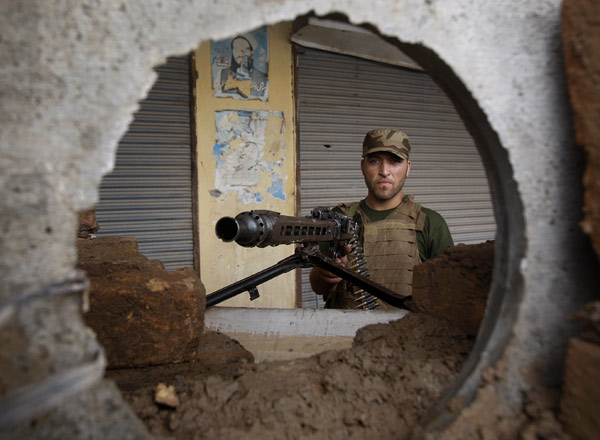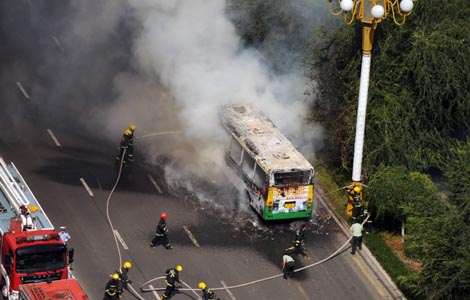The 'softer' solution to terror
Updated: 2013-08-06 08:09
By Zhang Yunbi (China Daily)
|
||||||||
Editor's note: China Daily continues its series of reports and human interest stories from neighboring countries in an effort to provide insight into topics relevant to China. Pakistan is the second installment.
 |
|
A Pakistani paramilitary soldier poses for a photographer at a checkpoint after authorities reopened a road in Bara, a town in the Pakistan Khyber Tribal region along the Afghan border, on Saturday. More than 150,000 government troops have been deployed to the border area in recent years. Mohammad Sajjad / Associated Press |
Pakistan's military says it has made progress in cracking down on Taliban terrorists, deploying large numbers of soldiers along its northern borders and reclaiming land from local fighters.
In recent years, Islamabad has also been emphasizing economic development as a means of combating further extremism.
Lieutenant Colonel Abid Ali Askari, additional director of Inter Services Public Relations, said that Pakistan has deployed more than 150,000 troops along the border with Afghanistan to help eradicate terrorist organizations, including the Taliban. As a result, the Taliban-controlled area in the north of Pakistan has shrunk from 14,900 square kilometers in 2008 to 1,200 sq km this year, the official said.
However, Askari said Pakistan was building on military gains by investing in the region's economic development, with the aim at exterminating local terrorism.
The Pakistani military's war with the Taliban has never been an easy one. The country's "inhospitable terrain" is a natural obstacle to military deployment in tracking terrorists and border trespassers. Mountainous or hilly terrain accounts for more than half of the country's territory.
Extreme weather, fragile communication infrastructure and the lack of civic amenities in the federally administered tribal areas along the border are also hampering the fight against terrorism, Askari said.
In addition, Pakistan is located at the crossroads of the continent, bordering India to the east, Iran and Afghanistan to the west, and China to the north.
Its geopolitical location poses challenges for the Pakistani authorities in their efforts to control trespassers and prevent foreign terrorists from entering the country, analysts said.
It is particularly difficult for the Pakistani military to monitor the mountainous border with Afghanistan, Askari said.
"Cross-border trade, commerce and intermarriages are common practices in the area, and tribal people move across the border freely," he said.
An estimated 12,000 vehicles and 31,000 people cross the Pakistan-Afghanistan border through various routes in Balochistan province every day, according to statistics provided by Askari's agency.
- US, Pakistan to start new chapter in relations
- US, Pakistan agree to start new chapter in long-strained relations
- Kerry opens talks in Pakistan on anti-terror co-op
- Kerry in Pakistan on unannounced visit
- US Secretary of State to visit Pakistan
- Sharif's ally elected president
- Pakistan condemns latest US drone strike
- Pakistan to elect new head of state
Most Viewed
Editor's Picks

|

|

|

|

|

|
Today's Top News
Obesity rate on the increase
Washington Post sold to Amazon's founder
Fonterra says sorry for 'anxiety'
Detroit Symphony brings China to NYC
Service sector drives up growth
Globalization of Chinese culture becomes hot topic
Huawei expands in London
Web 'answer to export woes'
US Weekly

|

|













